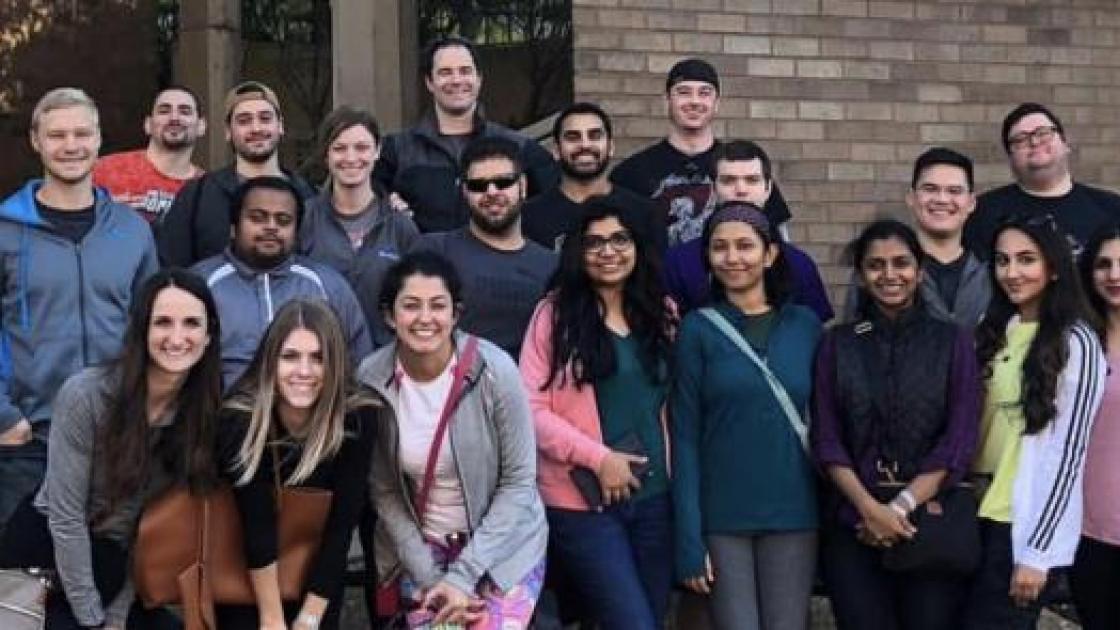
Tracks
Preliminary Medicine
Of the 11 preliminary medicine positions, we offer:
- 4 linked to the SIU Radiology residency
- 3 linked to the SIU Dermatology residency
- 4 linked to the SIU Neurology residency
SIU Preliminary Medicine Residency will prepare you for advanced standing programs. Rotation experiences and expectations are identical to categorical residents, including unique opportunities during Y week specific to the needs of the advanced standing program. Our Preliminary Medicine residents have fewer hospitalist weeks and more elective time relative to categorical track residents. As a 3 + 1 program the academic year consists of 13 X rotations and 13 Y weeks.
The first year has 13 X rotations for 39 weeks of inpatient medicine.
- General internal medicine- 12 weeks
- 24 weeks of Subspecialty Medicine including: Cardio, Endo, GI, Hem/Onc, ID, Med/Psych, Neuro, Pulm and Rheum
For those who are interested in one of the linked positions, an ERAS application should be submitted to the “home department”. It is not necessary to interview with the Department of Medicine, but you are certainly welcome to visit the Medicine program on your interview day if you wish. Please discuss this with the Residency Coordinator in the home program in order to coordinate this visit.
For more information on our programs, email Catherine Brower
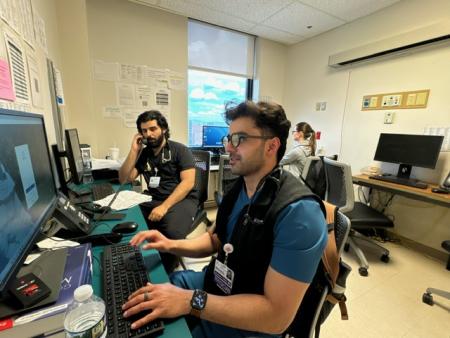
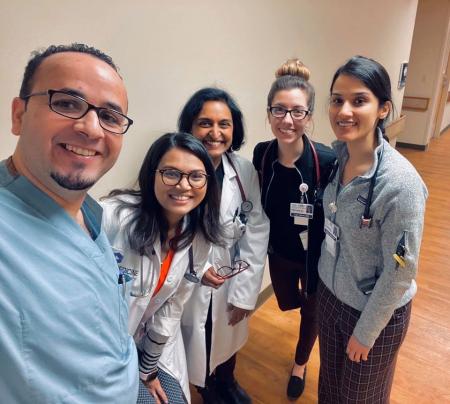
Medicine-Psychiatry

Medicine Psychiatry is a branch of medicine which provides care to the patients with problems at the interface of adult general medicine and adult psychiatry. Patients for whom we care, are afforded a high level of multidisciplinary care that can encompass primary care delivery, psychiatric care or a combination of both.
Our goal is to provide and advance quality health care to patients with psychiatric, medical and combined illness while assisting in the improvement of skill and knowledge of the residents and students we teach. In addition, as part of the Departments of Internal Medicine & Psychiatry the Division of Medicine-Psychiatry provides its students and residents with an intensive, community-based education that mirrors the real world in which they will practice.
When Did Medicine-Psychiatry Begin at SIU?
Ranked as the third oldest combined medicine-psychiatry program in the United States, this program formally began in July 1992. Our 5-year, combined residency program received approval from the Boards of Internal Medicine and Neurology Psychiatry on April 1, 1993. It was reapproved on July 2002.
For more information on our programs, email Vivian Smith
Categorical Program
First Year:
PGY–1 residents provide care in inpatient settings directly supervised by senior residents, fellows and clinical faculty. In our developmental progression first year residents are typically identified as early learners to beginning/able managers.
Rotations include:
- 5-6 Wards: 15-18 weeks
- 1-2 Swing: 3-6 weeks
- 1 ICU: 3 weeks
- 4 subspecialty: 16 weeks
- Total of: 39 weeks
Second Year:
PGY–2 residents are indirectly supervised and obtain advanced training in internal medicine subspecialties and the intensive care unit. Second year residents comprise the night medicine services and the medicine subspecialty night consult service. Typically, second year residents are identified as able to advanced managers.
Rotations include:
- 3-4 Intensive Care: 9-12 weeks
- 3-4 Night Medicine: 9-12 weeks
- 1 Ambulatory: 3 weeks
- 5 subspecialty: 12-15 weeks
- Total of: 39 weeks
Third Year:
PGY-3 residents assume added responsibility as supervisors and teacher/leaders on hospitalist and intensive care services. Third year residents are capable of oversight supervision and typically are identified as advanced managers or teacher-leaders.
The senior year schedule includes:
- 4-5 Wards: 12-15 weeks
- 1 Intensive Care: 3 weeks
- 6-7 subspecialty: 18-21 weeks
- Total of: 39 weeks
Research
Research blocks can be requested in PGY2 or PGY3 if a resident wishes. They will replace a subspecialty experience.
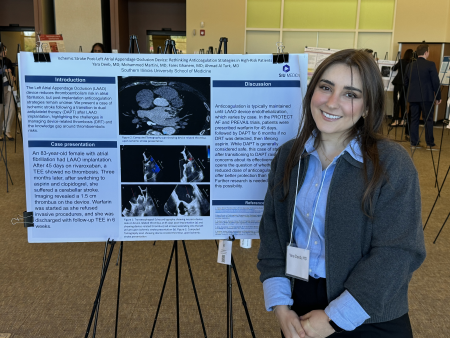
Hospitalist Service
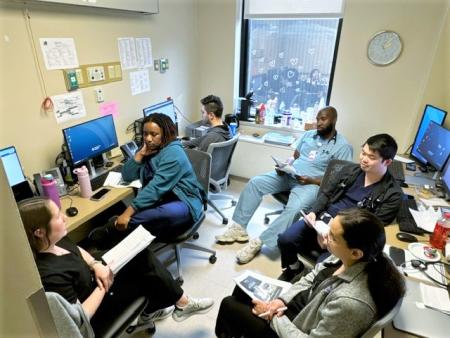
Located at Springfield Memorial Hospital our Hospitalist General Medicine Services consists of 5 teams of 2 PGY-1 residents and a PGY-3 senior resident. Residents are both admitting patients and serving as medicine consultants. Features of our hospital Medicine Service Include:
- Drip model for admissions and consultations.
- Day shifts start at 6:30 a.m. and ends after 5pm hand-off.
- Morning and afternoon handoffs are directly observed by faculty.
- 12pm-1pm Resident Conference Series (Wednesdays are Grand Rounds).
- Dedicated nurses and pharmacists support the hospital service.
Sample schedule for ward teams
| Monday | Tuesday | Wednesday | Thursday | Friday | |
| 6:30 | Pre-rounds | Pre-rounds | Pre-rounds | Pre-rounds | Pre-rounds |
| 7:00 | Morning handoff | Morning handoff | Morning handoff | Morning handoff | Morning handoff |
| 7:30 | Pre-rounds | Pre-rounds | Pre-rounds | Pre-rounds | Pre-rounds |
| 8:00 | |||||
| 8:30 | |||||
| 9:00 | Rounds | Rounds | Rounds | Rounds | Rounds |
| 9:30 | |||||
| 10:00 | |||||
| 10:30 | |||||
| 11:00 | |||||
| 11:30 | |||||
| 12:00 | Noon Conference | Noon Conference | Grand Rounds | Noon Conference | Noon Conference |
| 12:30 | |||||
| 13:00 | Team Education/New Patients | Team Education/New Patients | Team Education/New Patients | Team Education/New Patients | Team Education/New Patients |
| 13:30 | |||||
| 14:00 | |||||
| 14:30 | |||||
| 15:00 | |||||
| 15:30 | |||||
| 16:00 | |||||
| 16:30 | |||||
| 17:00 | Afternoon handoff | Afternoon handoff | Afternoon handoff | Afternoon handoff | Afternoon handoff |
Y-Week/Clinic Week
Goals for Y-Week
- Enhance ambulatory medicine knowledge and skills through clinical practice, asynchronous online didactic and interactive learning experiences.
- Participate in outpatient team based care to achieve patient centered goals including access to care and provider continuity, while learning effective practice management.
- Monitor your progress and outcomes towards the goal to become an independent outpatient practitioner in Internal Medicine.
3 main structures
- Your ambulatory continuity provider and shared practice partners.
- Your selected longitudinal subspecialty clinics.
- Tuesday academic half day & Hopkins ambulatory modules as assigned.
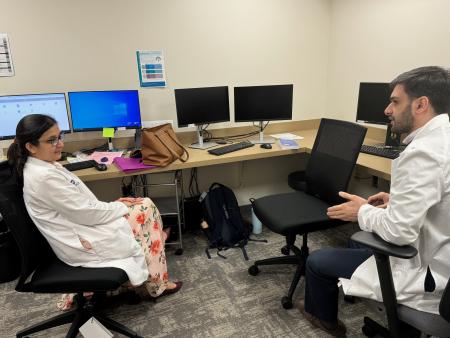
Continuity Clinics
- Categorical residents will be assigned to a single attending physician or clinic for the duration of their internal medicine residency.
- Residents will attend 5 GIM Continuity Clinics and 3 subspecialty clinics every Y-week.
- Residents have a panel of 105 patients to evaluate and manage in the attendings office under the direct supervision of their attending physician.
- With supervision of the attending physician, each resident will provide all ongoing care to patients seen by him/her in the ambulatory clinic, including all follow up of acute or chronic medical problems, preventative and maintenance health care, appropriate counseling of patients and families, and patient education.
- Telephone messages, prescription refills, lab reports, and emergency or after-hours care of residents' patients will be handled by the residents if possible. Residents should routinely check their EHR desktop for follow-up on patient labs and ancillary studies as available and call the patient. Inform the office nurse of your communications in a task.
- Each resident will be evaluated biannually by their faculty preceptor in the ambulatory setting.
- Absence from clinic will be permitted for vacations, educational leaves, illness or personal emergencies. One of the three weeks of vacation will come during the Y-week.
Why a 3-week inpatient duration?
- Three-week inpatient dwell time provides for 13 rotations each year.
- Three weeks of a rotation appear to be an ideal amount of time to spend on any given rotation.
- Three weeks per rotation encourages multiple dwell times during 36 months.
- Residents can sort out career goals by requesting a specific rotation multiple times across the 36 months.
- Golden weekends follow every in-patient rotation which allows recovery time before each clinic week.
